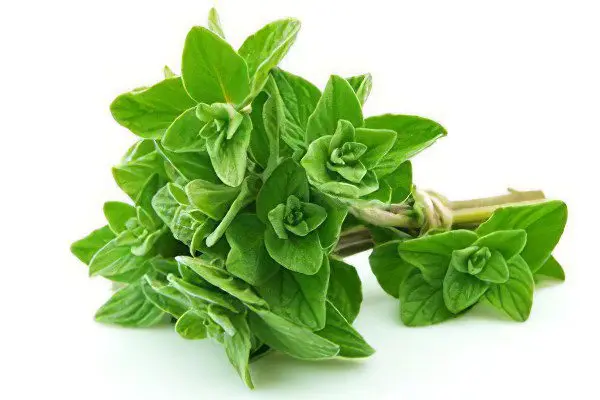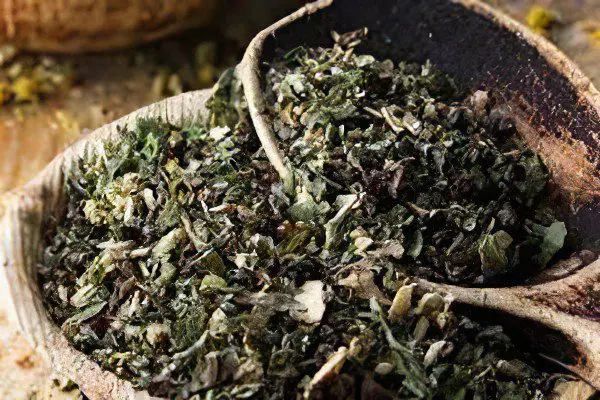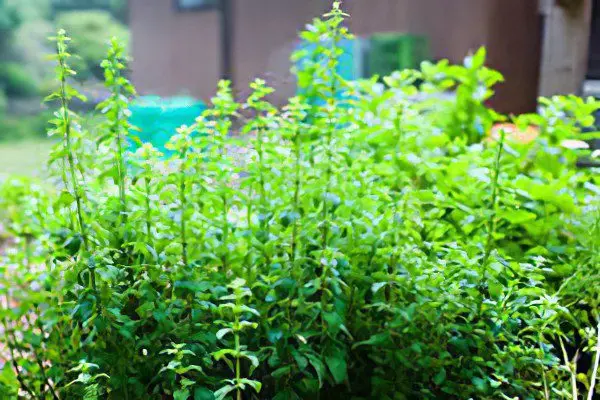Oregano – what is it?

Oregano is a type of perennial spicy-aromatic bushy plant of the Lamiaceae family. The shrub has branched stems, which are covered with small oval-shaped leaves and small inflorescences of white or pinkish color. This plant is widespread in Europe, the Mediterranean countries and in Russia. Oregano grows, as a rule, in glades, forest edges, mountain slopes.
Oregano is mainly used in cooking – as a spice for sauces, meat, vegetables. Without this fragrant spice, it is impossible to imagine Italian cuisine with its pizza, pasta and various sausages. In France and Belgium, oregano is often added to mushroom dishes, vegetable soups, marinades, and baked goods. You can also add oregano to kvass, beer or wine – drinks acquire a special smell and are stored longer without sour.
Oregano has a very bright bitter-spicy, slightly burning taste, so you need to add it to dishes very little. You can use both fresh leaves and dried, ground into powder. You can also freeze oregano – so it will retain its freshness for a long time. Thanks to this spice, the taste of cooked food becomes more tender and rich. Oregano goes well with basil, rosemary, marjoram, mint, pepper.
Oregano is often used for medicinal purposes – medicinal tea, decoctions, infusions are prepared with flowers, leaves and stems. This plant is also used for external use in the form of lotions, compresses, and relaxing baths are also taken with it. In the perfumery and cosmetics industry, oregano is added to soaps, shampoos, facial lotions, and toothpaste.
Along with basil, oregano is a hallmark of such a popular Mediterranean cuisine. Oregano has been known for over 2000 years; the ancient Greek philosopher and physician Hippocrates mentioned it in his writings. Translated from the Greek oregano as “mountain decoration”, another common name is oregano.
According to the legends, animals wounded in the forests of Crete – deer, wild goats, were looking for this particular grass, which was also called ash. Animals ate this grass, and the arrows soon came out of their bodies, the wounds healed, the effect of the poison, if the arrow was poisoned, was neutralized. People noticed this and also began to use oregano to treat wounds, and later discovered other properties of this plant.
Useful properties of oregano

First of all, oregano is a medicinal plant with a strong wound healing effect. Leaves and flowers of oregano contain a large amount of essential oils, tannins. Oregano contains thymol and carvacrol, thanks to which this herb is superior in action to many existing antihistamines and antiseptics. It has oregano and antimicrobial property.
Due to the high content of tannins, oregano is able to protect the body from the effects of food poisoning, prevent the growth of bacteria that have entered the body along with poor-quality food. Decoctions and tinctures of this herb will help get rid of diarrhea, indigestion, flatulence. On the other hand, oregano can mask the smell of stale food, passing it off as fit for consumption – you should be careful here.
Oregano is a mild antispasmodic that can relieve many pains. Oregano works well with headaches, muscle pain and spasms. Oregano oil is used for rubbing the back with rheumatism and sciatica, with pain in the joints. A tampon with a few drops of this oil applied to the tooth will save you from a toothache.
In disorders of the nervous system, oregano is also recommended. It is believed that by adding it to food, you can get rid of insomnia. This herb increases tryptophan levels, promoting overall calmness. Previously, this herb was often used to treat hysteria, epilepsy. At present, doctors still do not recommend self-medication in cases of severe neurosis or depression, but herbal therapy is quite suitable as a mild sedative that improves sleep. Often, oregano is recommended for children who have an increased excitability of the nervous system, excessive activity.
During the menstrual period, women are advised to take a decoction of this herb not only to relieve the pain symptom, but also to normalize the emotional state. Oregano is also advised to use to prevent inflammatory diseases of the genitourinary system. Breastfeeding mothers who experience problems with milk supply are advised to add oregano to their food. During menopause, decoctions from this plant help the body to rebuild more easily and cope with hormonal disruptions. There is evidence that with the help of this plant, early menopause can be “postponed” a little, allowing the ovaries to prolong their vigorous activity.
Oregano has a beneficial effect on the functioning of the gastrointestinal tract, improves intestinal motility, increasing the tone of smooth muscles, and significantly enhances the secretion of the digestive glands. This herb also helps with diseases of the biliary system – biliary dyskinesia, cholecystitis. Thus, we can talk about a mild laxative effect of this plant.
A decoction of oregano is also an immunomodulating and general tonic, necessary for colds, during the period of the FLU epidemic. The beneficial effect of oregano on human immunity can also be explained by a very serious content in its chemical composition of vitamins (group B, vitamin C, A, K, E) as well as micro and macro elements (calcium, magnesium, iron, sodium, phosphorus, manganese, selenium). and zinc).
In the treatment of colds, oregano will help to cope with a cough, even its severe and chronic forms. For many, this herb helps stop asthma attacks, alleviate the condition of pulmonary tuberculosis. This is due to the pronounced expectorant effect of the active substances. In case of problems with the respiratory tract, it is advised to rinse the nasal cavity with oregano decoction – this helps with sinusitis, acute pharyngitis, tonsillitis. The herb has an anti-inflammatory effect, relieves itching and swelling. With angina, it is also advised to gargle with a decoction of oregano.
The external use of oregano is also widespread. Sometimes compresses from infusions of this herb literally work wonders, relieving eczema, fungal diseases, acne, pustular lesions, neurodermatitis, abscesses. Oregano tincture is effective for herpes. This herb saves after insect bites, burns, frostbite. Baths and rubdowns with oregano are successfully used for problems with sweating of the body and legs.
In folk medicine, decoctions of oregano are used to treat alcoholism, get rid of depression. This herb is believed to improve mood. Not so long ago, scientists discovered the ability of oregano to have a beneficial effect on the condition of people affected by cancer, as well as prevent heart disease.

[Video] Dr. Berg talks about 14 scientifically proven benefits of oregano oil:










qayerdan sotib olsam boʻladi